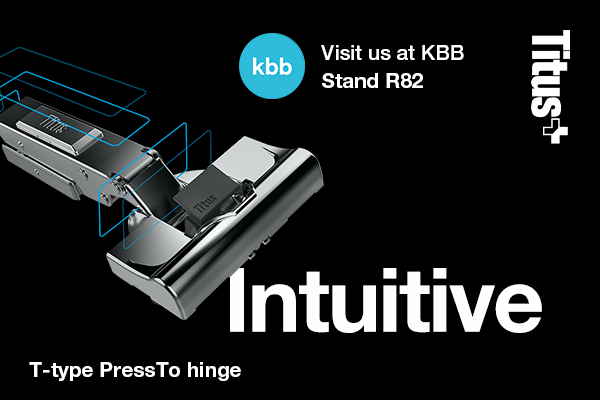With rising revenues through the pandemic, a Jarrow furniture manufacturer is expecting turnover to march beyond £4m this year, after using state-of-the-art VR technology to revamp its workshop and chip away at lead times.
Funky Chunky Furniture, which manufactures its handmade furniture and shelving product range at its 1200 sq m Jarrow workshop, revamped its entire facility last year after receiving support from the Sustainable Advanced Manufacturing (SAM) Project.

Coleridge dining room
Employing 24 people, the firm reported three consecutive record months during the pandemic – with sales topping £350,000 in June – thanks to the introduction of new machinery and processes allowing it to significantly reduce lead times and increase output by over +30%.
Working with academics and manufacturing experts from the SAM Project, Funky Chunky Furniture utilised state-of-the-art VR and simulation software to completely redesign its workshop and explore how it could use floorspace to maximise output and reduce costs.
This helped the company mitigate the majority of the challenges brought about by the pandemic, allowing production to flow seamlessly while the UK home improvement boom led to soaring demand for its products from customers across the UK and Europe.

Kevin Johnston, founder and MD, says: “The company has grown YoY since we launched in 2013 and we’d been considering revamping our processes for some time, until we were introduced to the team at SAM.
“Originally, we had an idea of how we wanted to do it. However, being able to use state-of-the-art VR and simulation technology allowed us to map out our workshop digitally and use the software to visualise how we could move our machines around, ensuring we maximised lead times and identified bottlenecks up front, without actually having to halt production and move a single machine.
“Not only did this allow us to continue operating while we transformed the workshop, but it also helped us identify and invest in new automated machinery that slashed sanding and waxing times, while eliminating the bottlenecks across production lines.
“The support we received has been fantastic and has helped take the business to the next level.”
Having reported three record months during the pandemic, Kevin and the team are predicting turnover to more than double in the next year – from £1.9m to over £4m – and are embarking on a recruitment drive in a bid to match their ambitions.
Kevin adds: “We’re forecast to double our turnover this year, which is really exciting. We’ve invested in a major rebrand and have significantly ramped up our marketing efforts over the past 12 months which, combined with this expansion, we’re confident will stand us in good stead.

“We’re also looking to bring on board another 12 members of staff, which will take our headcount to 35/36, as we look to capitalise on this growth and ensure we grow at a sustainable rate. However, we also need to make sure we bring the right people in so that we can maintain our company culture – but I suppose that’s all part of running a growing business.”
SAM offers four key support functions to businesses that are gearing up to grow, including: access to technical expertise, with industrial specialists using their skill and expertise to guide businesses through the process of understanding and implementing technology; R&D, with a team of researchers able to support with the development of new products and processes; factories and facilities, including access to £1m of industry-leading advanced technology and equipment; and its grants scheme, which offers financial assistance to businesses that qualify.
Ken Teears, project manager at SAM, comments: “We are delighted to have been able to work with Kevin and the team at Funky Chunky Furniture to not only explore the possibilities of VR but also to invest in the machinery required to take the business to the next level.
“As an SME that manufactures its entire product range here in the North East, it’s a real success story for the region’s manufacturing sector, and Kevin is a perfect example of what can be achieved when business owners embrace new technologies and continue to innovate, even during the most testing times.”
As well as its comprehensive suite of support, the SAM Project is in the final couple of months of its phase 1 grant scheme, which includes funding for innovation projects as well as an adapted grant scheme to help SME manufacturers looking to pivot during the pandemic. SAM is urging eligible businesses to apply for funding before time runs out. There is less than £100k of funding remaining in phase 1, so companies need to act quickly to receive funding over the summer.

The fund provides support to companies that have had to diversify or adapt in order to stay in business and operational during and after Covid-19, with match-funding grants of up to £10,000 available, as well as the company’s normal funding stream to support businesses looking to diversify, or improve products and processes in order to grow.
Applications can be for new capital equipment or external expertise – excluding working capital, salaries, rent or rates – to help a company survive, adapt and sustain itself through and after the crisis. Companies looking to innovate and grow are still encouraged to apply, even if their capital investment is not specifically as a result of Covid-19.
This could include buying capital kit to help diversify income, bringing outsourced processes and parts manufacture in-house (such as re-shoring parts made overseas to safeguard supply chains), improvements required in manufacturing operations as a result of social distancing measures and Government guidelines, or any manufacturing- and production-specific capital investment to help the company diversify, stay afloat or take advantage of changes in market conditions.
Grants are offered at a 50% rate in County Durham and 40% rate in Tyne and Wear and Northumberland. The current grant fund ends in September 2020.
Sustainable Advanced Manufacturing is a collaboration between the European Regional Development Fund (ERDF) and University of Sunderland, and was set up to support North East (LEP) SME manufacturers to explore and introduce new technology to improve their products or processes. It was funded with a £2.6m commitment from ERDF and £2.5m from the University of Sunderland, and is aimed solely at small- and medium-sized manufacturers (fewer than 250 employees), with an annual turnover of less than €50m (approximately £45m)









